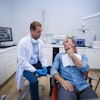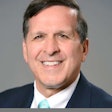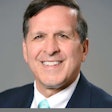
"Can you pass the plumber's tape?"
This is definitely a strange thing to say during treatment. In reality, the plumber's tape is a truly important part of certain composite restorations. I learned that trick many years ago from my good friend, Dr. Leann Brady. She mentioned it again during her presentation last month at the ADA meeting in San Antonio.
 Sheri B. Doniger, DDS.
Sheri B. Doniger, DDS.However, what are the patients thinking? How many items do we have in our armamentarium that sound, well, funny? Spoon? Excavator?
After I had made the plumber's tape comment, I mentioned to my dental assistant that it must sound funny to the patient. My patient in the treatment chair said, "You should name it something sexy, like MacGyver's tape."
Why not? For those of you millennials who do not know who MacGyver is, or was, he was the title character of a television show from the 1985 to 1992 played by the actor Richard Dean Anderson. MacGyver was a top agent for the Phoenix Foundation, a progressive agency devoted to righting the world's wrongs. Not only was MacGyver a genius, he also never carried a gun. Instead, he solved the problems of the world with everyday items, such as plumber's tape. In one episode, I think he defused a bomb with a hockey ticket.
“At the end of the visit, after the temporary cement was removed from her tooth, the patient asked, 'What is a buckle?'”
Not only do our instruments sound odd, but our terminology does also. We had a patient in today who needed a crown preparation. During the discussion, I mentioned "the buccal of the tooth surface." At the end of the visit, after the temporary cement was removed from her tooth, she asked, "What is a buckle?"
I was slightly taken aback. I thought for a moment about the two homonyms, buckle and buccal, and realized she was not asking about the metal fitting that closes a belt but the cheek side of the tooth. After I explained what buccal was, she thought it was a strange word.
I described the buccinator muscle, also with the same derivative of "bucca-," Then, I got curious as to where it came from. Thank goodness for Google! After the procedure, I researched "buccal." It is from the Latin "bucca" and the Old English "al," derived in the early 19th century. Fascinating. She was very satisfied when she left the office with a newfound knowledge of a dental term.
The list goes on. I do believe I explain the steps to our procedures with care while we are performing dentistry. I wonder how many other terms patients think are funny or strange.
Sheri B. Doniger, DDS, practices clinical dentistry in Lincolnwood, IL. She is currently vice president and president-elect of the American Association of Women Dentists and editor of the American Association of Women Dentists "Chronicle" newsletter. She has served as an educator in several dental and dental hygiene programs, has been a consultant for a major dental benefits company, and has written for several dental publications. You can reach her at [email protected].
The comments and observations expressed herein do not necessarily reflect the opinions of DrBicuspid.com, nor should they be construed as an endorsement or admonishment of any particular idea, vendor, or organization.



















